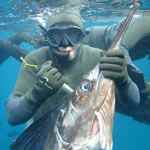 Blue water spearfishing is done away from the shallows in the open ocean. Using sounders, a spearo will normally target underwater panicles and ledges that drop off into the abysses. The submersed ocean features tend to be magnets for fish activity.The theory is that these interesting attractions break up the endless nothingness of the open ocean and gives the smaller fish something to hide around. The monsters of the deep are in turn attracted to the fish activity and hunt around these pinnacles or rush up from the deep.
Blue water spearfishing is done away from the shallows in the open ocean. Using sounders, a spearo will normally target underwater panicles and ledges that drop off into the abysses. The submersed ocean features tend to be magnets for fish activity.The theory is that these interesting attractions break up the endless nothingness of the open ocean and gives the smaller fish something to hide around. The monsters of the deep are in turn attracted to the fish activity and hunt around these pinnacles or rush up from the deep.
Once you’ve found a spot like this you have a couple of options open to you. If it’s a regular spot then you may set up a semi-permanent mooring over the best spot and hang off the boat. Alternatively, the most common option is to jump in and ‘drift’ over this feature. Once you’ve passed over it you are picked up and dropped off at the start again.
Once in the water, you are still way above all the activity so you need to use all your tricks to draw up the fish. First you’ll engage your flasher. A flasher is a small float with about 10 – 20 meters of line with loads of shiny silvery things at the bottom. The idea is that as you jiggle them they catch the sun and also catch the eye of any nearby fish. Remember that to a fish, any shiny silver normally represents food, and if it’s moving in an unusual way then it’s probably injured and thus an easy meal! Flashers work really well on things like Wahoo and Dorado but not so well on tuna. Remember that if a Wahoo is right on your flasher then you have a great chance of tagging it. You can pretty much drop right down on top of it and shoot it from overhead. It should have no idea what you are up to, allowing you to place a tricky but good shot. However, if it has swam in from the side then you’re going to have a challenge on your hands. Never make eye contact and never head straight for it; they spook so easily so you have trick them into believing you’re not interested in them at all. Tuna on the other hand are a different story altogether.
If you’re trying to raise the buffalo of the ocean then you need to adopt a more drastic technique we all know as chumming. Jigging your flasher should at the very least raise other small fish like rainbow runners that you can pick off. Instead of saving them for the pot you’re going to invest them in trying to raise the tuna. Make sure the fish is dead then start cutting away at it; the smaller pieces the better. Use the serrated side of your knife if you have one and scar at it. Its not so much the chunks that will bring them up but more the scent in the water. You want a big blood trail with bits and pieces floating down. If tuna are around they will quickly follow up the chum trail in a manic manner.
When they come up they will be excited and fast moving. The first time you see one you may well laugh because at speed they seem to wobble as they swim. Be quick with your shot as they dart in and out; they are hard to raise a second time round if you miss your opportunity. Tuna are virtually the exact opposite to Wahoo in the sense that you can be far less cautious and bulldoze yourself towards the all the action. While you still want to adopt your hunting techniques, you can be far more bullish about the whole affair.
At first you will feel that there is something very Darwin about floating around at the source of a chum trail and to be fair, it’s not uncommon to visited by the men in grey suits. Use your common sense, if they look agitated and there are too many to keep your eye on then get out of the water. If it’s just one or two just cruising around then use your instinct and experience to make the call.
Blue water spearfishing courses – New to blue water spearfishing? Then why not let one of our instructors train you up!
